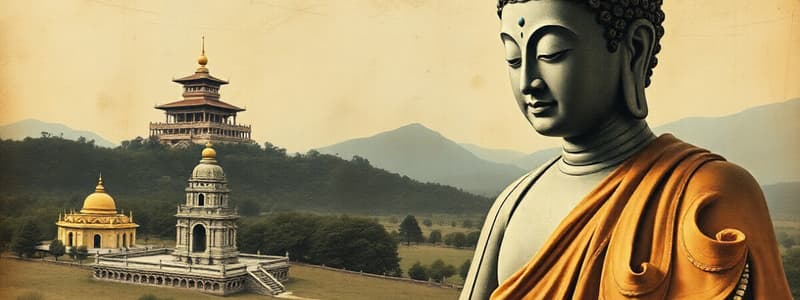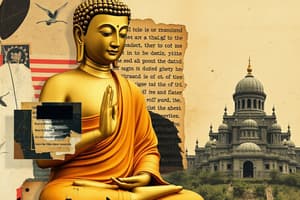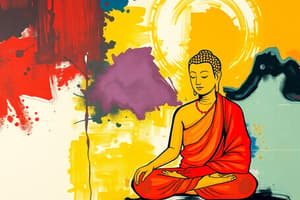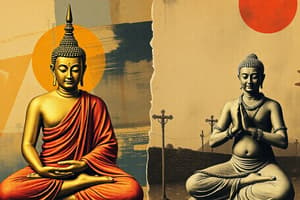Podcast
Questions and Answers
Siddhartha Gautama was born in India around the year 563 BCE.
Siddhartha Gautama was born in India around the year 563 BCE.
False (B)
Siddhartha's father wanted him to become a homeless monk.
Siddhartha's father wanted him to become a homeless monk.
False (B)
Buddhism began during a time of significant social and political change in India.
Buddhism began during a time of significant social and political change in India.
True (A)
Siddhartha Gautama saw suffering and death for the first time during a stroll outside his father's palace.
Siddhartha Gautama saw suffering and death for the first time during a stroll outside his father's palace.
Most Buddhist teachings are based on the experiences of Siddhartha Gautama.
Most Buddhist teachings are based on the experiences of Siddhartha Gautama.
Siddhartha Gautama became the Buddha after he realized that craving leads to suffering.
Siddhartha Gautama became the Buddha after he realized that craving leads to suffering.
King Ashoka ruled southern India for 45 years and was instrumental in spreading Hinduism.
King Ashoka ruled southern India for 45 years and was instrumental in spreading Hinduism.
Mahayana Buddhism suggests that religion serves as a vehicle to assist individuals in achieving liberation.
Mahayana Buddhism suggests that religion serves as a vehicle to assist individuals in achieving liberation.
Theravada Buddhism is considered the more liberal branch of Buddhism that diverged significantly from the original teachings of the Buddha.
Theravada Buddhism is considered the more liberal branch of Buddhism that diverged significantly from the original teachings of the Buddha.
Buddha's last words were an encouragement for his followers to seek liberation through their own efforts.
Buddha's last words were an encouragement for his followers to seek liberation through their own efforts.
Flashcards are hidden until you start studying
Study Notes
Context of Buddhism's Origin
- Buddhism emerged in India during the 6th century BCE amidst significant social and political upheaval.
- The era saw the formation of kingdoms, urbanization, and the expansion of trade routes, contrasting with the simplicity of village life.
- Hinduism was the dominant religion at the time.
Siddhartha Gautama (Buddha)
- Siddhartha Gautama, known as the Buddha, was born around 563 BCE in present-day Nepal to a warrior caste family.
- A prophecy predicted he would become either a great leader or a monk, prompting his father to shield him from life's harsh realities.
- Siddhartha lived in luxury, married a princess, and had a son, but remained unaware of human suffering.
- His worldview shattered upon encountering illness, aging, death, and a solitary monk, leading to his spiritual quest.
The Quest for Enlightenment
- Siddhartha renounced his privileged life to seek answers about suffering and existence, becoming a monk.
- He practiced meditation and extreme asceticism for six years, nearly starving himself.
- After fainting from deprivation, he realized that extreme asceticism was not the solution.
- In Bodh Gaya, while meditating under a Bodhi tree, he attained enlightenment, becoming the Buddha and discovering nirvana – the cessation of craving.
Buddha's Teachings and Legacy
- After enlightenment, Buddha decided to share his insights, establishing the foundation of Buddhism.
- He preached the Middle Way and the Four Noble Truths for 45 years, emphasizing a balanced approach to life.
- Buddha died at 80 near Varanasi, believed to have achieved parinirvana, comparable to Hindu moksha.
- His final words encouraged followers to actively pursue personal liberation.
The Spread of Buddhism
- King Ashoka of the Mauryan Empire (ruled northern India for 35 years) played a crucial role in promoting Buddhism.
- He commanded his subjects to follow Buddha's teachings and sent missionaries abroad, beginning in Sri Lanka.
- Buddhism spread through regions like Myanmar, Thailand, and Vietnam, adapting over centuries.
- Sri Lanka is a prominent center for early Buddhist history.
Schools of Buddhism
- Theravada Buddhism ("the way of the elders") emerged in regions influenced by King Ashoka and is viewed as the most authentic form of Buddhism.
- Mahayana Buddhism ("large vehicle") arose later, aiming to unify smaller schools. It promotes a more inclusive approach to liberation.
- Vajrayana Buddhism ("thunderbolt vehicle"), also known as Tibetan or Zen Buddhism, is more esoteric and lacks wide accessibility.
The Nature of Deity in Buddhism
- Buddhism does not center around the worship of a personal god, often leading to its classification as an atheistic religion.
- Theravada Buddhism adopts an agnostic view on the existence of gods, focusing instead on overcoming personal suffering.
Buddha's Teachings
- Buddha's first public talk was at the Deer Park in Sarnath, presenting the dharma (cosmic order).
- Central to his teachings are the Four Noble Truths, delineating the essence of Buddhism and the pathway to enlightenment.
Studying That Suits You
Use AI to generate personalized quizzes and flashcards to suit your learning preferences.




